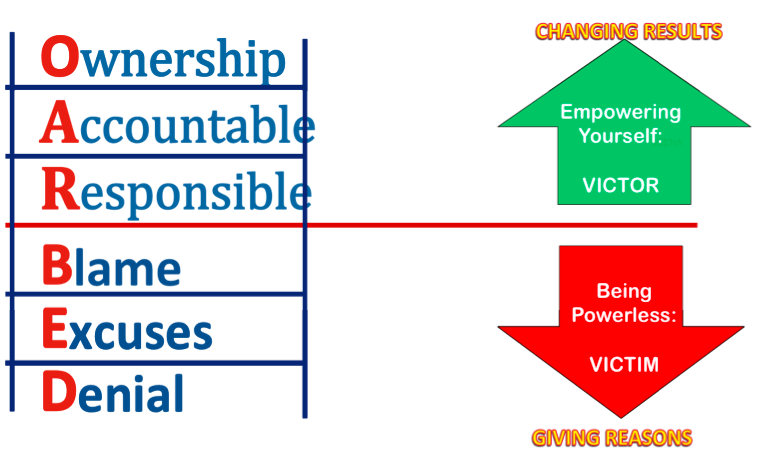Are you ‘above or below the line’ is probably the most powerful statement you can give when you try to give someone the keys to their own future success.
The ‘line’ is the line of response. Something happened, and you have to respond. You can act below the line, or above. You can be a loser, or fight to be a winner.
What does all of this really mean?

‘Are you above or below the line’ is actually a question that asks ‘are you a powerless victim that gives reasons why he or she cannot change a situation, or are you a victor that explains a situation from the context of how they can change the response to a situation for the better?’
When you take a closer look at this question of are you a Victim that gives Reasons versus a Victor that looks for Results, you can actually see that there is a ladder of increasing involvement with a situation. At the bottom of this ‘ladder of response’ we find:
DENIAL
Ever had a situation where you said “I had no clue it was that bad”? That must have been a situation where you were suddenly taken out of Denial.
Examples of Denial are the refusal to look at the scales, or not looking at the Profit and Loss. Not asking for something that you know might confirm that there is something wrong.
Excuses
At the second rank of the ladder of response we find Excuses. With Excuses we usually put a very mild blame on things, as if what happened was unavoidable, and therefore nothing you should really even put any energy in to address.
“Sorry, the market is down so there were just less people to buy” is such an excuse. Or, “yeah, that seems to happen to all of us.” Or “Sorry, didn’t have the time to do that. Next time I will…”
Blame
Once we hit the rank of ‘Blame’ the game starts to change. There is now an elevated amount of emotion involved on the issue. Just like excuses, the problem is acknowledged. But, this time with passion and even anger, the finger is pointed somewhere else.
Therefore, when anger is involved, be on your guard for the Blame Game!
Responsibility
When we reach the rank of taking responsibility, something important has happened. Not only have we acknowledged that we have played a role in the event we are not happy about, we are also acknowledging that we need to at least participate if things need to be different next time.
We are now ‘Above the Line’– no longer just a powerless victim. This means that there is now a chance that things can change for the good.
Learn more about enabling your employees to take hold of their own success.
![]()
